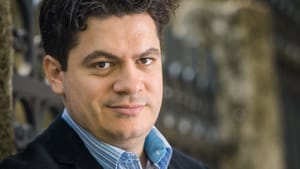Stay in the Loop
BSR publishes on a weekly schedule, with an email newsletter every Wednesday and Thursday morning. There’s no paywall, and subscribing is always free.
Pastoral days and sleepless nights
Cristian Măcelaru conducts the Philadelphia Orchestra

There’s a little suburb just north of Vienna where Ludwig van Beethoven, going deaf and considering suicide, retreated in 1802 to write his last will and testament. To the relief of the human race, the composer largely got over his dark slump, and in the same neighborhood, filled with white-washed cottages, golden vineyards, and near a little brook about the size of a drainage ditch, he later worked on his Sixth Symphony, the Pastoral.
Often called the sunniest of the master’s nine symphonies, the Sixth formed part of an elegant pre-Spring program with Cristian Măcelaru, the Philadelphia Orchestra’s young conductor in residence, at the podium. He led the orchestra in a huge, gushing, no-holds-barred performance. There’s nothing wrong with that; it does justice to Beethoven and brings smiles of delight to winter-weary audiences.
However. Beethoven’s sunniest symphony is also one of his airiest and most transparent. If ever a work cried out for original instruments, scaled down forces, subtle innuendos, and a lighter touch, it is the radiant Sixth. This performance, though, became a slog through the heavy weight of the cellos and violas, especially in the opening two movements. As close to program music as a Beethoven symphony gets, these sections seemed less reminiscent of a gurgling brook and more like Thor heaving lightning bolts down the Rhine.
Yet there were crystalline moments, including some elegant woodwind playing at the end of the second movement, poignant when we recall that by this time, Beethoven could no longer hear the bird songs he loved. Just as Shakespeare can withstand endless variations and settings, from Italian medieval to American Mafia, Beethoven’s symphonies thrive on a rich variety of interpretations. While not my preferred reading of the Sixth, Măcelaru’s version is compelling; it should keep audiences who value thrills over nuance coming back for more.
Faded fragrance
Jorge Federico Osorio, champion of Mexican music and master of the standard piano repertoire, performed Manuel de Falla’s Nights in the Gardens of Spain. I first heard this work with the orchestra, Eugene Ormandy, and Philippe Entremont in the 1960s. Even after so many years, memory of that performance lingers like a faded fragrance: translucent, languid, sensuous. Măcelaru and Osorio opted for a more highly charged approach, one marked by drama, intensity, and volume, though Osorio’s powerful technique ensured that his strong performance would be heard no matter the decibel level of the surrounding players. (The sound of a symphonic orchestra can reach 140 decibels, roughly the same as a jackhammer or jet engine, but much nicer.)
The work is in three movements, evoking the moods of a Moorish garden near Granada. Although de Falla was influenced by French Impressionism (Debussy, Ravel), Măcelaru’s interpretation stressed power, dynamics, and precision, partnered with Osorio’s majestic virtuosity. But the effect lacked the Impressionistic eroticism and languor that is the hallmark of this enchanting work.
Suite #2, The Three-Cornered Hat, by de Falla, on the other hand, soared under Măcelaru’s confident hand. Every resource of the orchestra was called into play, and this time, the sonorities, the passionate staccatos, and unrestrained Spanish rhythms blended with intelligence and wit. Commissioned by Diaghilev, The Three-Cornered Hat ballet premiered in 1919, only six years after the premier of another Diaghilev commission, Stravinsky’s Rite of Spring. Pablo Picasso designed the costumes and sets for de Falla’s ballet, based on a story by Alarcón about an unscrupulous magistrate, a miller, and his wife. The ballet is notable for integration of classical ballet with Spanish dance.
What, When, Where
The Philadelphia Orchestra. Cristian Măcelaru, conductor; Jorge Federico Osorio, piano. Beethoven, Symphony No. 6 ("Pastoral"), Falla, Nights in the Gardens of Spain, for piano and orchestra; Suite No. 2 from The Three-Cornered Hat. Friday, March 13, 2015, Verizon Hall, Kimmel Center, Broad and Spruce Streets, Philadelphia. 215-893-1999 or www.philorch.org.
Sign up for our newsletter
All of the week's new articles, all in one place. Sign up for the free weekly BSR newsletters, and don't miss a conversation.

 Linda Holt
Linda Holt